Top 27 Ruby Developers and ROR Experts
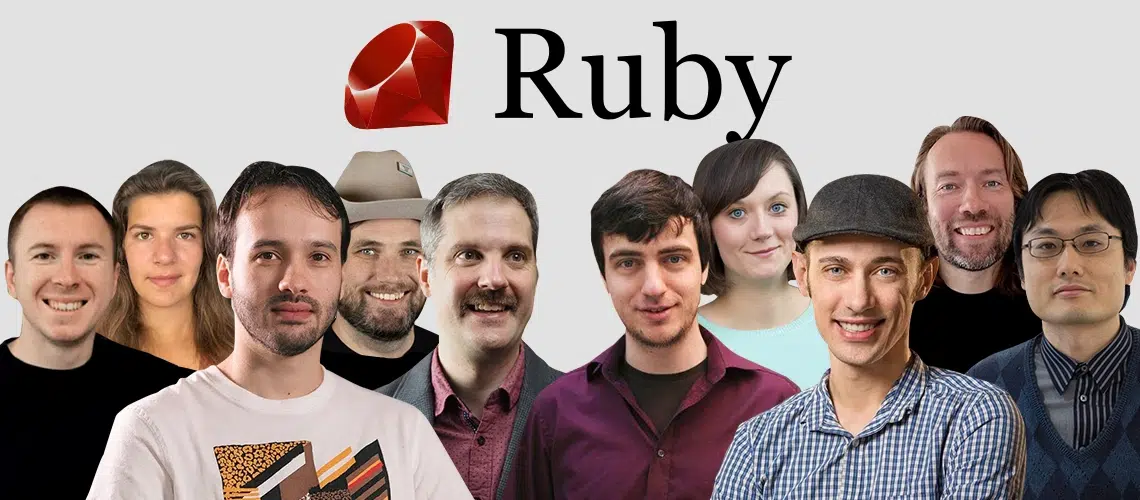
Ruby and its flagship framework, Ruby on Rails, have cultivated a vibrant ecosystem of developers, contributors, startup founders, educators, and more.
This curated list brings together top experts from both the Ruby and RoR communities, showcasing their significant contributions to the programming world.
- Jemma Issroff
- Dave Kimura
- Aaron Patterson
- Richard Schneeman
- David Heinemeier Hansson
- José Valim
- Koichi Sasada
- Tobias Lütke
- Jeremy Evans
- Konstantin Haase
- Dmytro Zaporozhets
- Sarah Mei
- Eileen Uchitelle
- Pat Shaughnessy
- Nobuyoshi Nakada
- Bozhidar Batsov
- Nate Berkopec
- Coraline Ada Ehmke
- Yehuda Katz
- Chris Oliver
- Sandi Metz
- Mike Perham
- Avdi Grimm
- Hiroshi Shibata
- Josh Lee
- Sam Saffron
- Akira Matsuda
Now, let’s delve into each of these individuals and their contributions:
Jemma Issroff

Nationality: American
Jemma is a star in the Ruby core team, known for her work on Ruby’s Garbage Collector and for fostering community inclusivity.
A performance enthusiast, she co-authored the book “Ruby Garbage Collection in Under Two Hours” and has written many deep-dives on how objects are allocated and collected in Ruby. Jemma joined Shopify’s Ruby Infra team and quickly made impactful contributions to MRI (she’s credited on improvements to GC compaction and memory management). In 2022, she was invited to become a Ruby committer – a rare honor, especially for someone relatively early in their career. Beyond coding, Jemma co-founded WNB.rb, a global group for women and non-binary Rubyists, creating a more welcoming space in the community.
She also helped organize the RubyConf Mini conference and frequently appears on podcasts and talks, enthusiastically explaining low-level Ruby topics (like how the parser or Just-In-Time compiler work). Jemma’s energy for teaching is evident in her weekly “Ruby Tip of the Week” newsletter (which she wrote for Ruby Weekly). In a short time, she’s become both a core contributor and a role model for inclusivity. Her passion for Ruby is infectious, and she’s ensuring that Ruby’s future (and community) are in good hands.
- X (Twitter): @JemmaIssroff
- Github: JemmaIssroff
- Website/Blog: jemma.dev
Dave Kimura
Nationality: American
Dave is a Rails developer and educator who hosts Drifting Ruby, a weekly Rails screencast series, and is a panelist on the Ruby Rogues podcast. Based in the U.S., Dave has over 16 years of experience with Rails. His Drifting Ruby episodes (200+ so far) cover practical tips and new gems, aimed at intermediate Rails developers looking to improve their skills. Dave is also known for his work on open-source minor projects and for being active in the Rails online community (StackOverflow, Reddit, etc.).
By sustaining Drifting Ruby for years, Kimura has created a rich library of tutorials that keep pace with the latest Rails features (from Webpacker to Hotwire to authentication solutions). This consistency is rare and valuable for the community – many developers tune in weekly to learn something new. As a Ruby Rogues panelist, he has engaged in discussions about Rails trends and best practices, influencing listeners worldwide. Dave also built ActionAuth, an open-source Rails authentication system, and shares many code examples on his blog.
His contributions are measured not just in code, but in the hundreds of hours of content and advice he’s provided, which have helped Rails developers stay up-to-date in a fast-moving tech landscape.
- Linkedin: Dave Kimura
- X (Twitter): @kobaltz
- Github: kobaltz
Aaron Patterson
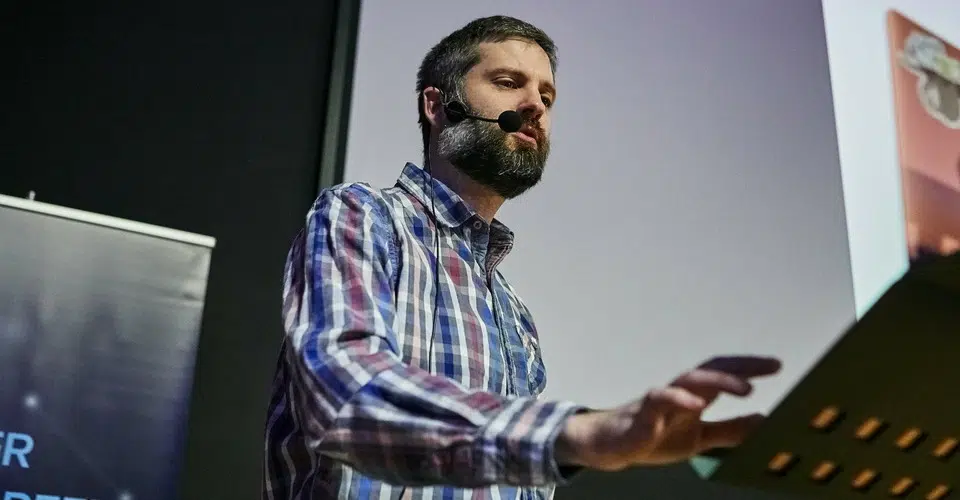
Nationality: American
Aaron is a superstar open-source contributor – notably, he’s the only person on the core teams of both Ruby and Ruby on Rails.
He has authored key libraries like Nokogiri (XML/HTML parser) and Psych (YAML parser) and improved Ruby’s garbage collector and performance. In Rails, he’s contributed countless patches, especially in ActiveRecord and caching, and is the all-time top contributor to Rails. Aaron’s work has made Ruby apps faster and more secure (he’s on Ruby and Rails security teams too). Currently a Senior Staff Engineer at Shopify, he continues to move both the language and framework forward.
His coding prowess is matched by a playful personality – known for humorous conference talks and cat jokes – which makes him an especially beloved figure in the RUBY world.
- Linkedin: Aaron Patterson
- X (Twitter): @tenderlove
- Github: tenderlove
Richard Schneeman

Nationality: American
Richard “Schneems” is a prominent Ruby/Rails engineer and educator who was a long-time member of Heroku’s Ruby team. At Heroku (a cloud platform for deploying Rails apps), he maintained important libraries like Sprockets (Rails asset pipeline) and co-authored ActiveStorage in Rails.
Schneeman created CodeTriage, a popular web app that helps developers find open issues to contribute to in Ruby/Rails repos. He also organizes the annual Keep Ruby Weird conference in Austin, Texas, blending community fun with tech talks. Schneeman’s work at Heroku helped optimize Rails for the cloud – he wrote patches to make Rails memory use more efficient on Heroku’s dynos and advocated for changes that landed in Rails core (like thread-safe code loading). His app CodeTriage has onboarded many newbies into contributing to Rails and other projects by curating issues. As a blogger, his articles (“How I Rails” series, etc.) and his book “How to Read Ruby” empower developers to dig into Rails source code.
Furthermore, by running Keep Ruby Weird and speaking at conferences, he keeps the community vibrant and welcoming. Schneeman exemplifies the complete Rails expert: open-source contributor, performance tuner, and community builder.
- Linkedin: Richard “Schneems” Schneeman
- Github: schneems
- Website/Blog: schneems.com
David Heinemeier Hansson
Nationality: Danish
DHH is the creator of Ruby on Rails, the hugely influential web framework that brought Ruby to the mainstream in 2004.
His work on Rails – extracted from the Basecamp project – earned him Google’s “Hacker of the Year” in 2005. Rails’ convention-over-configuration approach and elegant Ruby DSL attracted thousands of developers and startups (GitHub, Airbnb, etc. all began on Rails), fundamentally boosting Ruby’s popularity. David is also a co-founder and CTO of 37signals (Basecamp/HEY), where he proves Rails can scale to large applications. He remains a vocal advocate for simplicity in software and for Ruby’s values. His public writings (blog posts, books like Rework) often defend Ruby/Rails against trends, stressing developer happiness and productivity over “hard tech for its own sake.”
DHH’s outsized influence on web development and the Ruby community makes him one of the most famous Rubyists in the world.
- Linkedin: David Heinemeier Hansson
- X (Twitter): @dhh
- Github: dhh
- Website/Blog: dhh.dk
Jose Valim
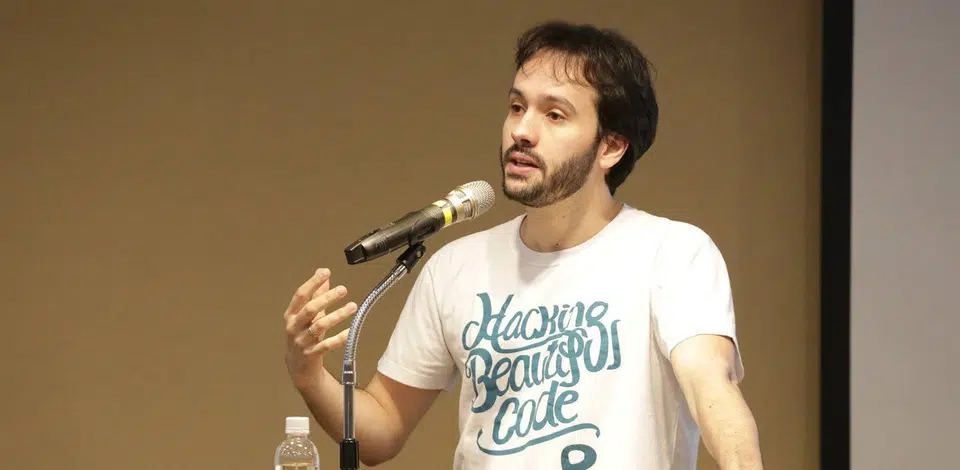
Nationality: Brazilian
José is the creator of the Elixir programming language and was a member of the Rails Core team from 2010 to 2014. A Brazilian software engineer, he made significant contributions to Rails in its early years – he is the author of widely-used Rails libraries such as Devise (authentication) and Simple Form. Valim received a Ruby Hero Award for his open-source work on Rails before he shifted focus to creating Elixir (in 2011) to explore concurrency beyond what Ruby offered.
During his Rails core tenure, Valim helped develop Rails 3 and 4, integrating the Merb framework’s ideas and creating the Rails API mode. His gem Devise became the de facto standard for Rails authentication, used in thousands of apps worldwide. He also co-created the Rails CoffeeScript integration and contributed to internationalization (I18n) in Rails.
After departing the core team, José’s creation of Elixir (inspired by his Rails scaling experiences) opened new paradigms, but he remains celebrated in the Rails community for the tools he built and the example he set as an open-source innovator.
- Linkedin: José Valim
- X (Twitter): @josevalim
- Github: josevalim
Koichi Sasada
Nationality: Japanese
Koichi is a Ruby core committer and the mastermind behind Ruby’s modern virtual machine.
He created YARV (“Yet Another Ruby VM”), which became the Ruby 1.9+ interpreter and significantly improved Ruby’s execution speed. Over decades on the core team, Koichi has led efforts in improving MRI’s performance and garbage collection (e.g. introducing a generational/incremental GC in Ruby 2.1). He also spearheaded Ruby 3’s guild/Ractor concurrency model to bring true parallelism to Ruby programs. A former professor turned full-time Ruby developer, Koichi joined Cookpad in 2017 to focus on Ruby development, and as of 2023 works on MRI at a Japanese tech firm (STORES.jp). His deep academic knowledge (PhD in Information Science) and hands-on contributions make him the go-to expert on Ruby internals.
Simply put, Koichi’s work on the VM (and now experimental JIT and concurrency) keeps Ruby fast and evolving.
- Linkedin: Koichi Sasada
- X (Twitter): @koichisasada
- Github: ko1
Tobias “Tobi” Lütke

Nationality: German
Tobi is the co-founder and CEO of Shopify, one of the biggest success stories built on Ruby on Rails.
In 2004, he began writing software (using then-new Rails) for an online snowboard shop, which evolved into the Shopify platform in 2006. Under Tobi’s technical leadership, Shopify grew into a global e-commerce company running a massive Rails monolith at scale. Uniquely, Tobi remained hands-on in coding for many years and was even an early member of the Rails core team, contributing code and feedback. He also created Liquid, the theming language used in Shopify storefronts, and ActiveMerchant, a widely used Ruby library for payment processing. Tobi’s advocacy for Ruby is strong – he has hired several Ruby core team members at Shopify and invested in Ruby’s future (YJIT, etc.).
As a tech CEO who still gets his hands dirty with code, he’s an inspiration in the Ruby startup scene, proving that you can start with Rails and scale to an IPO.
- Linkedin: Tobias Lütke
- X (Twitter): @tobi
- Github: tobi
Jeremy Evans
Nationality: American
Jeremy is a highly productive Ruby hacker known for creating the Sequel database toolkit and the Roda web framework.
As lead developer of Sequel (an alternative ORM to ActiveRecord), he has for years provided the community with a simpler, thread-safe, and flexible way to talk to databases in Ruby. He also built Roda, a super-fast routing framework, and Rodauth, a robust authentication framework – all emphasizing minimalism and performance. Beyond his own projects, Jeremy is a Ruby core committer who focuses on fixing bugs and polishing MRI (he has a reputation for submitting high-quality patches to Ruby). In fact, he received the Ruby Prize in 2020 for his work on keyword argument separation in Ruby 3. Jeremy is an exemplar of community-driven development: he’s active on forums helping others, writes detailed release notes for Sequel/Roda, and even authored a book (Polished Ruby Programming).
He’s also the maintainer of Ruby ports for OpenBSD, ensuring Ruby runs smoothly on that OS. With a career spanning many libraries, Jeremy’s ethos is all about clean design and reliability. Many companies quietly run on his software. By contributing both to Ruby’s core and its ecosystem, Jeremy Evans has earned deep respect as a “developer’s developer” in the Ruby world.
- X (Twitter): @jeremyevans0
- Github: jeremyevans
Konstantin Haase
Nationality: German
Konstantin is an open-source prodigy known for his work on web frameworks and tooling.
As a teenager, he became the lead maintainer of Sinatra, the minimalist Ruby web DSL, and co-authored the O’Reilly book Sinatra: Up and Running. Under his guidance, Sinatra grew into a staple for small web services, used at companies like Heroku and Apple. Konstantin also co-founded Travis CI, the hosted continuous integration service that was very popular in the Rails community (and beyond) for running tests – he served as CTO there. Additionally, he’s contributed to Rails, Rack, Rubinius and many Ruby gems (he’s known as “rkh” online). His code is characterized by brevity and cleverness (famous for a demo where he refactored Sinatra to 6 lines). Konstantin won a Ruby Hero Award early on and has been active in Ruby’s evolution (e.g. contributing to routing in Rails).
Currently, he’s the founder/CTO of another startup (Valid), but still an “open-source enthusiast” at heart. Konstantin’s impact: he provided the community with Sinatra’s simplicity as an alternative to Rails, and improved developer workflow via Travis CI. Not many in their 20s can claim that level of influence on Ruby’s ecosystem.
- Linkedin: Konstantin Haase
- X (Twitter): @konstantinhaase
- Github: rkh
Dmytro Zaporozhets
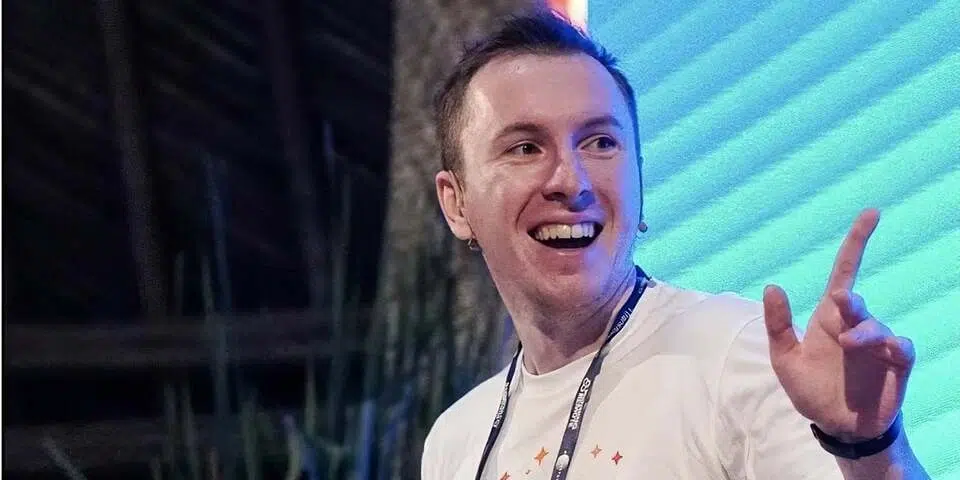
Nationality: Ukrainian
Dmytro is the co-founder of GitLab, a major DevOps platform written in Ruby.
In 2011, he created GitLab as an open-source alternative to GitHub, initially as a Rails application he hacked on at night. By 2014 it grew into a company, with Dmytro as CTO scaling both the code and the engineering team. GitLab’s codebase (one of the largest open-source Rails apps) benefited greatly from his contributions and leadership. He guided the project from a two-person endeavor to a billion-dollar company with worldwide contributors. Notably, Dmytro stayed based in Kharkiv and kept coding in Ruby throughout GitLab’s rise, becoming a hometown tech hero in Eastern Europe. His story showcases how far a passionate Ruby developer can go – from side-project to unicorn.
Dmytro’s impact spans coding (he built the initial feature set of GitLab) and community (proving that open source + Ruby can create something huge).
- Linkedin: Dmitriy Zaporozhets
- X (Twitter): @dzaporozhets
- Website/Blog: dzaporozhets.me
Sarah Mei
Nationality: American
Sarah is a senior software engineer and thought leader focused on the human side of software development. She co-founded RailsBridge in 2009 – an initiative that offers free Rails workshops to underrepresented groups, which has since expanded globally. Based in San Francisco, Sarah has been a director of Ruby Central (which runs RailsConf) and is a recipient of the Ruby Hero Award and O’Reilly Open Source Award for her contributions to diversity and education in the Rails community.
Through RailsBridge (now part of Bridge Foundry), Mei helped bring thousands of newcomers (especially women) into the Rails community by lowering the barriers to entry. As an architect and consultant (formerly at Salesforce/Ministry of Velocity), she’s written and spoken extensively about maintaining large Rails codebases – her essay “Rails is Omakase” and others challenge assumptions and encourage inclusive, team-oriented coding practices. Sarah has also mentored developers (often pairing with Sandi Metz to teach design).
Her influence is notable in the emphasis on community culture in Rails – making the community more welcoming and aware of team dynamics is as much her legacy as any code.
Eileen Uchitelle
Nationality: American
Eileen is a powerhouse engineer who has improved both Ruby and Rails, especially in the context of large-scale apps.
She first made her mark at GitHub, where she led the effort to upgrade their massive Rails monolith from version 3.2 to 5.2, and implemented features like cross-database associations in Rails 7 to support GitHub’s multi-db architecture. Eileen became a member of the Rails Core team in 2017 and has contributed heavily to Rails’ framework code (particularly in Active Record and railties). Recently, in 2023, she was invited onto the Ruby Core team as well, recognizing her contributions to MRI (such as improvements to garbage collection and performance tuning for real-world apps).
Now at Shopify as a Senior Staff Engineer, Eileen works on Ruby & Rails infrastructure at scale, sharing lessons from running some of the world’s largest Rails apps. She’s also an advocate for open source mentorship and making both Rails and Ruby more welcoming. Whether it’s keynotes about the internals of Rails or pull requests to make Ruby faster, Eileen bridges the gap between the framework and language. Her passion and skill have earned her a spot as one of the few who sit on both Rails and Ruby core teams simultaneously.
- Linkedin: Eileen Uchitelle
- X (Twitter): @eileencodes
- Github: eileencodes
- Website/Blog: eileen.codes
Pat Shaughnessy
Nationality: American
Pat is a Ruby developer and author who currently works at Apple and is known for deep explorations of Ruby internals.
He wrote the acclaimed book “Ruby Under a Microscope”, which dissects how Ruby and its MRI interpreter work under the hood. Pat’s blog posts and conference talks often take complex topics (garbage collection, parsing, etc.) and make them understandable for average Rails developers. He has been a regular speaker at RailsConf and RubyConf, sharing insights that help developers appreciate the magic inside Ruby and Rails.
Through Ruby Under a Microscope, Shaughnessy demystified the internal implementation of things like Ruby’s objects and method lookup, benefiting framework developers and curious Rails engineers alike. His writing style (with clever analogies and diagrams) lowered the barrier to contributing to MRI and also indirectly to Rails (since understanding Ruby internals can lead to writing more optimal Rails code). Additionally, Pat has contributed code to open source – he’s known to experiment with Ruby C extensions and has contributed to projects like Nokogiri. By shedding light on what happens beneath Rails (at the Ruby level), he’s given many a deeper appreciation and toolkit for debugging performance issues.
Pat continues to share knowledge via his blog and tweets, even as he applies his skills to large-scale systems at Apple.
- Linkedin: Pat Shaughnessy
- X (Twitter): @pat_shaughnessy
- Github: patshaughnessy
Nobuyoshi “Nobu” Nakada
Nationality: Japanese
Nobu is often called the “secret weapon” of Ruby’s core team – he’s the most contributor to CRuby (MRI) in history.
Since the early days of Ruby, he has made over 10,000 commits to the language, fixing bugs, implementing features, and refactoring code. Many Ruby developers might not know his name because he works humbly in the background, but virtually every Ruby release has Nobu’s fingerprints on it. From critical bug fixes to improvements in the standard library, his contributions are too numerous to list. Nobu has been a tireless full-time Ruby maintainer, ensuring each new version is stable and polished. A 2014 RubyConf talk aptly titled “Nobody Knows Nobu” highlighted that he leads the all-time commit charts and is the person who “makes Ruby happen” day-to-day.
While not active on social media or as a conference speaker, in the Ruby developer community Nobu is revered as a quiet legend who has kept Ruby on track for over two decades.
Bozhidar Batsov
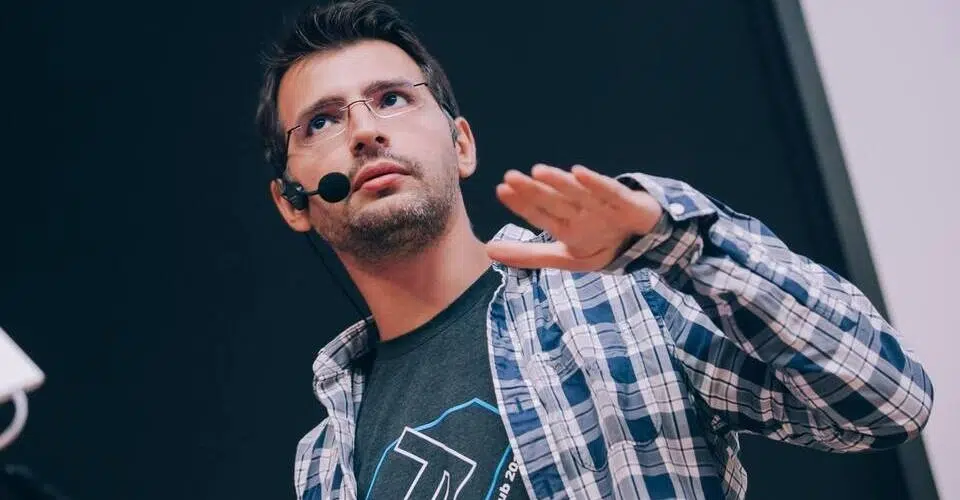
Nationality: Bulgarian
Bozhidar is an influential open-source contributor who has shaped Ruby coding practices.
He’s the creator of RuboCop, the widely used static code analyzer and linter for Ruby, which enforces a consistent style across projects. RuboCop (started in 2012) grew out of Bozhidar’s work on the community-driven Ruby Style Guide (which he initiated in 2011). Thanks to these efforts, Rubyists everywhere have a common set of best practices and an automated tool to check them – a lasting impact on code quality. Beyond RuboCop, Bozhidar has contributed to many Ruby and Rails libraries and even co-authored a book on Rails style. He’s also known in the Clojure world (maintaining the CIDER project), but his Ruby contributions are most prominent. Hailing from Bulgaria, Bozhidar often speaks about clean code and has helped mentor new OSS contributors.
His work embodies the saying “reading good code is as important as writing it”, giving the community guidelines to write beautiful Ruby code.
- Linkedin: Bozhidar Batsov
- X (Twitter): @bbatsov
- Github: bbatsov
- Website/Blog: batsov.com
Nate Berkopec
Nationality: American
Nate is a RoR performance expert and consultant, known for authoring “The Complete Guide to Rails Performance” and running the Rails Performance Workshop.
As a self-described “speed freak”, he specializes in helping Rails applications achieve low response times and efficient throughput. Nate is also a contributor to open source – he’s worked on Rack and other foundational pieces of the Ruby web stack – and he created the Discourse benchmarking tool and the rails_speed newsletter to share performance tips.
Berkopec’s book and material filled a crucial gap by showing developers how to benchmark and optimize Rails apps (covering topics like SQL tuning, caching, memory usage, etc.). He identified many common pitfalls (e.g., N+1 queries, slow view rendering) and provided actionable fixes, influencing how large production apps are managed. Nate also contributed to improving Puma, the Rails web server, by helping with its responsiveness and documenting how to get the best out of it. He is a regular speaker at Rails and Ruby events, evangelizing that Rails can scale when you know what to tweak.
Thanks to his work, “performance paranoia” is now more common in the Rails world – in a good way – resulting in faster apps for users.
- Linkedin: Nate Berkopec
- X (Twitter): @nateberkopec
- Github: nateberkopec
Coraline Ada Ehmke
Nationality: American
Coraline is a software developer and open-source advocate known for her work on diversity and ethics in tech.
She created the Contributor Covenant, the most widely adopted open-source code of conduct, which Rails and thousands of other projects use to define community standards. Coraline was a Rails developer at GitHub and Engine Yard, and later founded the Organization for Ethical Source. She won a Ruby Hero Award in 2016 for her community efforts.
Within the Rails ecosystem, Ehmke contributed code (she worked on ActiveRecord and Rails engines at Engine Yard) but her larger mark has been cultural. By introducing the Contributor Covenant in 2014, she provided a template that Rails and many gems adopted to encourage inclusive and harassment-free collaboration. This has had a lasting effect on open-source culture in the Rails world and beyond. Coraline also developed tools like Thermostat (to detect code toxicity) and the upcoming Hippocratic License for ethical OSS. She frequently speaks about open source governance, and her blog and talks challenge the community to improve not just code, but also the environment in which code is made.
Through her activism and technical contributions, Coraline Ada Ehmke has helped ensure the Rails community strives to be as welcoming as the framework is productive.
- Linkedin: Coraline Ada Ehmke
- X (Twitter): @CoralineAda
- Github: CoralineAda
Yehuda Katz
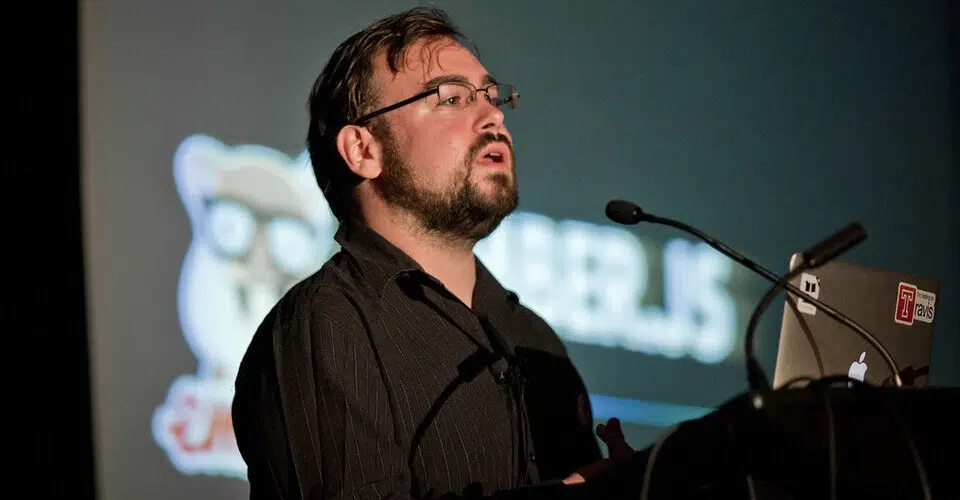
Nationality: American
Yehuda is a retired Rails Core team member who was instrumental in the Rails 3 era and co-created essential tools like Bundler.
Based in the US, Katz first made his mark by leading the Merb framework, which was merged into Rails in 2008. As part of the Rails Core team afterward, he helped unify Merb’s ideas with Rails and, along with Carl Lerche, created Bundler to manage Ruby gems (now a standard tool in every Rails app). Katz later co-founded Tilde Inc. and co-created Ember.js, a popular JavaScript framework.
Yehuda was a driving force in the transition from Rails 2 to Rails 3, bringing in better modularity and performance. He ensured Rails had a robust dependency management solution – Bundler – which developers still rely on daily. He also developed Thor (a toolkit for scripting and command-line tasks) and contributed to jQuery. A self-described open-source “standardista”, Katz engaged in web standards (TC39 for JavaScript) and even Rust language development.
His broad influence across Rails, JavaScript, and even Rust showcases his versatility, but Rails developers remember him best for making gem management and framework integration smoother in the early 2010s.
- Linkedin: Yehuda Katz
- X (Twitter): @wycats
- Github: wycats
- Website/Blog: yehudakatz.com
Chris Oliver
Nationality: American
Chris is a solo developer-entrepreneur who has become a one-man resource hub for Rails developers.
He’s the creator of GoRails, a Rails screencast and forum site, and builder of several Rails-based services such as Hatchbox.io (Rails server hosting) and Jumpstart Pro (a Rails SaaS template). Through GoRails, Chris has produced hundreds of video tutorials covering everything from beginner Rails setup to advanced feature implementations, helping thousands of developers level up.
Oliver’s GoRails (founded ~2013) filled the gap left by sites like RailsCasts, keeping fresh content flowing for the latest Rails versions. He also contributes to open source – for example, the Pay gem (for payment processing in Rails) – and often shares code snippets via his blog and GitHub. His work on Jumpstart Pro packaged the typical startup features (auth, billing, etc.) into a reusable Rails template, accelerating new app development. Essentially, Chris has turned his passion for Rails into platforms that educate and equip the community. As an educator and toolmaker, he embodies the supportive, knowledge-sharing spirit that makes the Rails ecosystem thrive.
- Linkedin: Chris Oliver
- X (Twitter): @excid3
- Github: excid3
- Website/Blog: excid3.com
Sandi Metz
Don’t write code you’ll need to explain. Write code that explains itself.
Nationality: American
Sandi is a globally respected Ruby educator, consultant, and author who has elevated the craft of writing object-oriented code.
She wrote the best-selling book Practical Object-Oriented Design in Ruby (POODR) in 2012, which is considered a must-read classic by Rubyists – “anyone who programs Ruby has heard of POODR”. Through POODR and her follow-up work (99 Bottles of OOP), Sandi taught a generation of developers how to design flexible, maintainable Ruby apps.
She is a sought-after conference speaker known for crystal-clear, friendly explanations of principles like SOLID, and for live-refactoring sessions. Sandi’s influence can be felt in countless codebases that apply her teachings (e.g. smaller classes, clear interfaces). Beyond writing, she coaches teams and gives workshops on practical OOD. Her mantra “prefer duplication over the wrong abstraction” has saved many projects from over-engineering. In short, Sandi Metz shaped Ruby programming style as much as Rails did – by showing that good design matters.
She continues to inspire through talks and her work in the community, making complex ideas accessible to all.
- Linkedin: Sandi Metz
- X (Twitter): @sandimetz
- Website/Blog: sandimetz.com
Mike Perham
Nationality: American
Mike is the author of Sidekiq, the immensely popular background job processing framework for Ruby. Sidekiq (launched 2012) introduced multithreading to Ruby job runners, dramatically improving throughput and efficiency.
It quickly became the dominant solution for handling background tasks in Rails apps, replacing previous alternatives (Resque, DelayedJob) and even influencing Rails to become thread-safe by default. Mike not only built the open-source Sidekiq (which millions of sites use), but also a sustainable business by offering Sidekiq Pro/Enterprise add-ons – pioneering the “open-core” model in the Ruby world. He later created Faktory, a polyglot background job system. Mike’s contributions go beyond code: through his blog and talks, he has educated developers on writing thread-safe Ruby and scaling systems. By relentlessly focusing on simplicity and performance, he kept Sidekiq lean and fast, often sharing benchmarking insights.
His work has arguably powered a huge portion of the Ruby ecosystem (any app with background processing likely uses Sidekiq). Mike remains active maintaining Sidekiq (now at version 8+) and engaging with the community on performance topics. He exemplifies the indie OSS entrepreneur – showing that one Rubyist can change the landscape for everyone.
- Github: mperham
- Website/Blog: mikeperham.com
Avdi Grimm

Nationality: American
Avdi is a prominent Ruby guru who has spent over a decade teaching and inspiring developers.
He’s the creator of RubyTapas, a popular screencast series of bite-sized Ruby videos that ran for 7+ years, through which he taught thousands of subscribers intermediate and advanced Ruby techniques. Avdi has also authored books like Confident Ruby (32 patterns for writing joyful code) and Exceptional Ruby, and was a host on the Ruby Rogues podcast. A recipient of the Ruby Hero Award for his community contributions, Avdi is known for championing object-oriented design (he even co-taught Sandi Metz’s POODR course) and for his approachable explanations. He has a talent for taking a messy piece of Ruby code and refactoring it live into something elegant – imparting lessons on block usage, dependency injection, and more along the way. Avdi’s blog posts and talks often delve into idiomatic Ruby patterns, helping developers “level up” their craft.
Beyond content creation, he’s contributed to open source (like early improvements to Ruby’s core and libraries) and remains an active mentor. In the Ruby community, Avdi Grimm is synonymous with pragmatic Ruby wisdom.
- Linkedin: Avdi Grimm
- X (Twitter): @avdi
- Github: avdi
- Website/Blog: avdi.codes
Hiroshi Shibata
Nationality: Japanese
Hiroshi (often known as “hsbt”) is an essential caretaker of Ruby’s ecosystem.
He wears multiple hats: Ruby core committer, release manager for Ruby distributions, and the lead maintainer of RubyGems (the package manager) and Bundler. Hiroshi ensures that gem installation and dependency management work seamlessly for millions of Rubyists – he oversees RubyGems releases and infrastructure. He has also contributed code to MRI and is a maintainer of tools like rbenv and ruby-build (for managing Ruby versions). As a “full-time OSS developer” working at Shopify, Shibata-san helps coordinate the Ruby release process and often proposes improvements (for example, he shepherded the merging of Bundler into RubyGems). He’s deeply involved in community efforts: he’s on Ruby’s release team and was president of Ruby Association in Japan, playing a big role in Ruby Kaigi conferences.
In short, when you install Ruby or gem install something, Hiroshi Shibata’s work is behind the scenes making it smooth. His dedication keeps the Ruby ecosystem’s wheels greased and running, and he advocates for the health of OSS maintainers. Few people realize how much we rely on him – but the core team does, which is why he’s a valued member of Ruby’s leadership.
- Linkedin: Hiroshi Shibata
- X (Twitter): @hsbt
- Github: hsbt
- Website/Blog: hsbt.org
Josh Lee
Nationality: American
Josh Lee, PhD, is a tech leader and full‑stack engineer who writes extensively about Ruby and RoR. He authored “Working With String in Ruby — All the Important Methods You Need to Know” on LinkedIn Pulse, where he walks through essentials like length/size, substrings, include?, strip, split, and to_i.
Beyond strings, he shares practical Rails tips such as creating dynamic select tags for model‑backed forms and a concise style guide. His content also covers integrating React with Rails and building CRUD features, reflecting hands‑on, production‑oriented Ruby work. He remains an active contributor on platforms like Medium and DEV, where he publishes tutorials on Docker, TypeScript, and web development patterns.
With a focus on clarity, utility, and developer-friendly explanations across both backend and frontend topics, his writing helps bridge the gap between Ruby fundamentals and modern full-stack workflows.
- Linkedin: Josh Lee
Sam Saffron
Nationality: Australian
Sam is a prominent entrepreneur-developer who co-founded Discourse, a popular open-source forum platform built with Ruby and Rails.
As CTO of Discourse, Sam has steered its technical architecture since 2013, creating a robust Rails application that serves millions of users across hundreds of communities. He’s a performance maven: before Discourse, Sam created mini_profiler, the performance profiling tool widely used in Rails apps to find slowness (later integrated into Stack Overflow and many sites). He also built memory_profiler and other dev utilities, sharing them freely. Sam is deeply involved in the Ruby performance community – he co-hosted Ruby Bench and often collaborates with Ruby core team members to test Ruby upgrades against real Discourse benchmarks. Under the hood, he’s contributed patches to Rails and even tweaks to MRI to fix memory bloat issues encountered in production.
Sam is also generous with his knowledge: he’s active on forums (including Discourse Meta and Rails discussions), blogging tips about PostgreSQL tuning, GC tweaks, etc., that he implements for Discourse. By open-sourcing Discourse, Sam gave the Ruby world a flagship example of a large, modern Rails app to learn from. And by continuously pushing for better performance – “fast, yet pleasant” as he likes – he has nudged both Rails and Ruby to improve. In sum, Sam Saffron exemplifies the hacker-founder: using Ruby to build a successful product and giving back improvements to the community along the way.
- Linkedin: Sam Saffron
- X (Twitter): @samsaffron
- Github: SamSaffron
- Website/Blog: samsaffron.com
Akira Matsuda
Nationality: Japanese
Akira is a Ruby and Rails committer and the author of Kaminari, one of the best-known pagination libraries in the Rails ecosystem. His long contribution history to Rails is also public on the Rails contributors site, reflecting sustained involvement beyond a single gem or feature.
He is also deeply tied to the community side of Ruby, including serving as Chief Organizer of RubyKaigi, one of the most important conferences for Ruby and Ruby core development. That combination of framework contributions, widely used tooling, and community leadership makes him a natural fit for any Ruby and Rails “who’s who” list.
- Linkedin: Akira Matsuda
- X (Twitter): @a_matsuda
- Github: amatsuda
Wrap Up
These experts represent exceptional talent, making them extremely challenging to headhunt. However, there are thousands of other highly skilled IT professionals available to hire with our help. Contact us, and we will be happy to discuss your hiring needs.
Note: We’ve dedicated significant time and effort to creating and verifying this curated list of top talent. However, if you believe a correction or addition is needed, feel free to reach out. We’ll gladly review and update the page.
Frequently Asked Questions
Yes, Ruby engineers are still in demand, particularly for maintaining and building applications with Ruby on Rails. While newer frameworks exist, many startups and enterprises continue to rely on Ruby for web development.
In the United States, Ruby developers typically earn $90,000 to $125,000 per year. Hourly contract rates range from $45 to $85 depending on experience and project scope. Rates in Eastern Europe and Latin America are usually lower.
A Ruby expert should have strong experience with Ruby on Rails, database design (PostgreSQL, MySQL), API development, and testing frameworks like RSpec. Familiarity with scaling applications and cloud deployment is also valuable.
You can hire Ruby developers through IT staffing firms, freelance platforms such as Toptal and Upwork, or agencies specializing in Ruby on Rails development. Reviewing GitHub contributions and open-source work is also helpful.
Ruby is used by companies such as GitHub, Shopify, Airbnb, Twitch, and SoundCloud, along with many startups that value fast development cycles.
